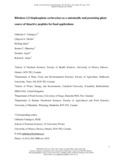JavaScript is disabled for your browser. Some features of this site may not work without it.
| dc.contributor.author | Udenigwe, Chibuike C. | |
| dc.contributor.author | Okolie, Chigozie L. | |
| dc.contributor.author | Qian, Huifang | |
| dc.contributor.author | Ohanenye, Ikenna C. | |
| dc.contributor.author | Agyei, Dominic | |
| dc.contributor.author | Aluko, Rotimi E. | |
| dc.date.accessioned | 2017-10-04T15:12:46Z | |
| dc.date.available | 2017-10-04T15:12:46Z | |
| dc.date.issued | 2017-09-11 | |
| dc.identifier.citation | Udenigwe C, Okolie C, Qian H, Ohanenye I, Agyei D, Aluko R, Ribulose-1,5-bisphosphate carboxylase as a sustainable and promising plant source of bioactive peptides for food applications, Trends in Food Science and Technology, Vol. 69, Part A, November 2017, pp. 74-82 | en_UK |
| dc.identifier.issn | 0924-2244 | |
| dc.identifier.uri | http://dx.doi.org/10.1016/j.tifs.2017.09.001 | |
| dc.identifier.uri | http://dspace.lib.cranfield.ac.uk/handle/1826/12590 | |
| dc.description.abstract | Background Plant proteins are well-known precursors of bioactive peptides. In translating the peptides into functional foods, the protein sources need to be sustainable and readily available. Ribulose-1,5-bisphosphate carboxylase/oxygenase (RuBisCO) is the major enzyme in photosynthesis and photorespiration in plants and some other organisms, and is known to be the most abundant protein on earth. Therefore, RuBisCO is an attractive and sustainable source of bioactive peptides. Scope and approach This review discusses the structure, function, composition and technology for plant RuBisCO extraction, as well as the fractionation and known bioactivities of its enzymatic hydrolysate and peptides. Feasibility of industrial scale up and practical application of the RuBisCO peptides in food were also considered. Key findings and conclusions Several processes are available for extraction of the RuBisCO subunits and some are simple, fast and adaptable for industrial scale production. Work is however needed on recovery of high protein yields with high purity. Most studies reported that peptides, mostly from the large subunit, from enzymatic hydrolysis of spinach or alfalfa RuBisCO possess antihypertensive, opioid-like, secretagogue and food intake stimulating, antioxidant and antimicrobial activities. These properties demonstrate that RuBisCO can be utilized as a sustainable source of peptides with multiple bioactivities for formulation of functional foods. | en_UK |
| dc.language.iso | en | en_UK |
| dc.publisher | Elsevier | en_UK |
| dc.rights | Attribution-NonCommercial-NoDerivatives 4.0 International | |
| dc.rights.uri | http://creativecommons.org/licenses/by-nc-nd/4.0/ | |
| dc.subject | RuBisCO | en_UK |
| dc.subject | Peptides | en_UK |
| dc.subject | Antihypertensive | en_UK |
| dc.subject | Antioxidant | en_UK |
| dc.subject | Opioid activity | en_UK |
| dc.subject | Antidiabetic | en_UK |
| dc.subject | Antimicrobial peptide | en_UK |
| dc.title | Ribulose-1,5-bisphosphate carboxylase as a sustainable and promising plant source of bioactive peptides for food applications | en_UK |
| dc.type | Article | en_UK |
Files in this item
This item appears in the following Collection(s)
-
Staff publications (SWEE) [2825]

